Ungrateful Child? 5 Ways To Combat Entitlement In Kids
Dealing with endless requests and entitled attitudes? Help your child move from ungrateful to appreciative with these expert tips.

“I want hot dogs for dinner. I hate chicken.”
“The party was okay, but…”
“Everyone else gets to bring Lunchables to school.”
“I’m bored with this. I wish there was something else to play with.”
“We never get popcorn at the movies. It’s not fair.”
Entitlement is a sneaky thing.
We live in a world where discomfort is considered intolerable. And we mistakenly fall into the trap that our job as parents is to make sure our kids feel awesome. All the time.
So we rush in to satisfy, help and treat our kids so they never have to go without. After all, we love seeing our children happy.
But when their desires start turning into demands and enough is never enough, we can start feeling trapped. Like we’re raising a child who feels they deserve anything – just because.
This post contains affiliate links. For more information, see my disclosures here.
Amy McCready, author of The Me, Me, Me Epidemic puts it this way, “The entitlement epidemic usually begins with over-parenting: over-indulging, over-protecting, over-pampering, over-praising, and jumping through hoops to meets kids’ endless demands. Today’s generation of parents is overly invested in their child’s happiness, comfort, and success.”
The truth is that most people can’t fully appreciate the things that come easily. So it’s only natural for kids who don’t have to work hard, wait patiently, or experience struggle to fall victim to entitlement.
But luckily, there are a few remedies.
So if you’re worried you may have inadvertently given your child a sense of entitlement, if you’re starting to notice ungrateful behavior, or if you’re just worn down by endless negotiating, try using one of these strategies to get your child back on track.
Here’s what you’ll find in this post:
- What’s The Best Way To End Entitlement In Kids?
- 5 Ways To Remedy Ungrateful Behavior In Your Child
- What Does An Ungrateful Child Look Like Anyway?

WHAT’S THE BEST WAY TO END ENTITLEMENT IN KIDS?
When our kids struggle with tying their shoes…we teach them.
When our kids struggle with reading…we teach them.
When our kids struggle with making a sandwich…we teach them.
And we support them while they learn.
But when our kids struggle with appreciating what they have?
We punish and shame. Why?
I’ll be the first to admit that listening to my kids complain makes my skin crawl – especially when they should be acting grateful.
Perhaps you feel the same. And when the complaining starts, you want to jump straight into momsplaining about how lucky they are or “how they should be grateful because there are so many children who don’t have what they have…”
I’m right there with you.
But let’s be honest, shaming doesn’t teach gratitude. Neither does punishment.
Instead, we need to shift our focus and get back to teaching.
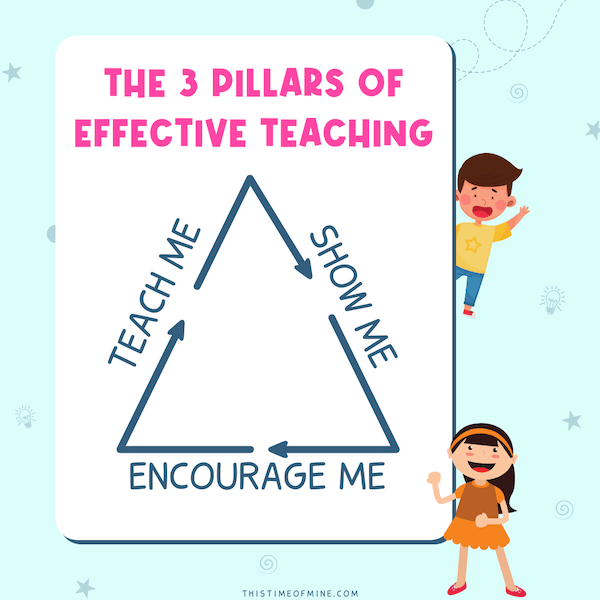
Because empathy is a learned behavior. Gratitude is a learned behavior. Appreciation is a learned behavior. And contentment is a learned behavior.

5 WAYS TO REMEDY UNGRATEFUL BEHAVIOR IN YOUR CHILD
Focusing on what you want to see more of (rather than what you want to see less of) will help you get clear in your teaching. And it will bring about lasting results.
So to help you know where to start, here are 5 ways to teach your child to shift their behavior from ungrateful to appreciative.
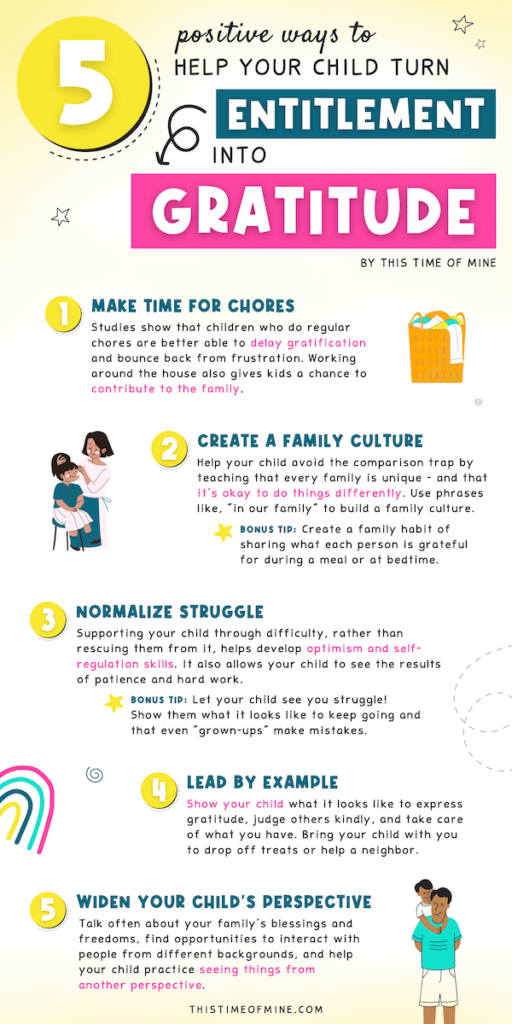
1. EXPECT MORE, DO LESS
We want do so many things for our kids in the name of love – including shielding them from work. But too much of a good thing can actually have adverse effects.
Many parents hold off on chores because:
- It’s faster and easier for them to just do the chores.
- They believe their kids are too young to help.
- They worry their constant nagging about chores will damage their relationship with their kids.
- They feel guilty for adding to the demands from school, friends, and other activities.
But research, like that of Marty Rossman, shows that making kids do chores is worth the effort. In fact, Rossman says, “the best predictor of young adults’ success in their mid-20’s was that they participated in household tasks when they were three or four.”
2. CREATE A FAMILY CULTURE
It’s normal for kids to compare themselves to others. But sometimes, they can start focusing on the fact that some have “more” than them, or feel like what others have is “better.”
Of course, it’s easy to take these comparisons personally or want to supplement so our kids can feel better. But we can best support our children in their growth by showing them that they should only compare themselves to themselves.
You can teach your children that every family is different. And that it’s okay for your family to do things your own way.
Using the phrase “in our family” can be a powerful way to create a family culture and instill an understanding of your family’s values and goals.
For example, you could explain to your disappointed child that some families may watch this movie, bring that kind of lunch, have these kinds of toys, or participate in those kinds of activities, and that’s okay. You could then say, “This is just how we do it in our family.”
CREATING A FAMILY CULTURE OF GRATITUDE
Another element to add to family culture is gratitude.
Make a family habit of pointing out things to be grateful for. Take it a step further by establishing a thankfulness routine. Give each person an opportunity to share something they’re grateful for at the end of each day, at dinner, or even in the car on the way to afterschool activities.

The Gratitude Challenge in our Challenges Kit makes it easy for your child to create a personal daily habit of practicing and expressing gratitude. Each activity can be done alone or as a family.
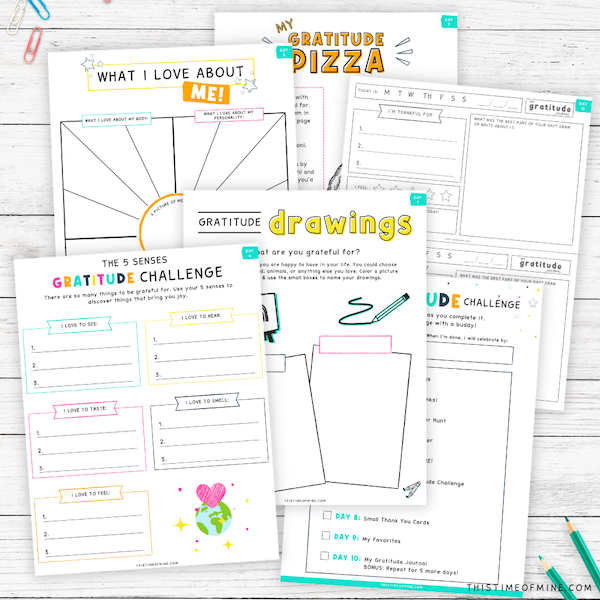
3. NORMALIZE STRUGGLE
Stress, failure, natural consequences, waiting patiently, hearing the word “no”…these aren’t easy things for kids to deal with. Neither are the big and difficult emotions they bring.
But as hard as it is to watch our kids struggle, we have to let them so they can learn to deal with the ups and downs life inevitably brings.
Each time we support our kids through difficulty – rather than rescue them from it – we are helping them break free from a victim mentality so they can develop important life skills.
Ones that will help them create a growth mindset, develop an optimistic outlook on life, grow their problem-solving skills, practice self-regulation, and take pride in their patience and hard work.
Want a powerful way to help your child strengthen their “resilience muscles”? Help them learn to set goals! This free Parent Starter Guide and printable Goal Ladder makes it easy for your child to get started.
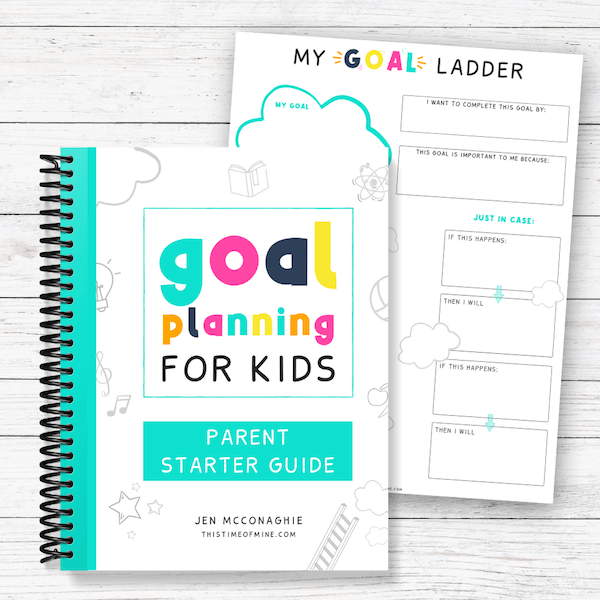
Bonus Tip: Let your kids see you struggle. Show them what it looks like to keep going when things get hard and that everyone makes mistakes. Kids often don’t realize that “grown-ups” struggle too.
4. LEAD BY EXAMPLE
When things don’t work out the way we want, it’s easy to blame, judge or focus too much on what we “deserve.” But when we do this, aren’t we modeling the very behavior we don’t want to see in our kids?
All of us have fallen victim to this type of behavior of course, but we can also make a more conscious effort to show gratitude, help others, and be more gentle in our judgment of others.
Because our kids are watching. And they learn a lot that way.
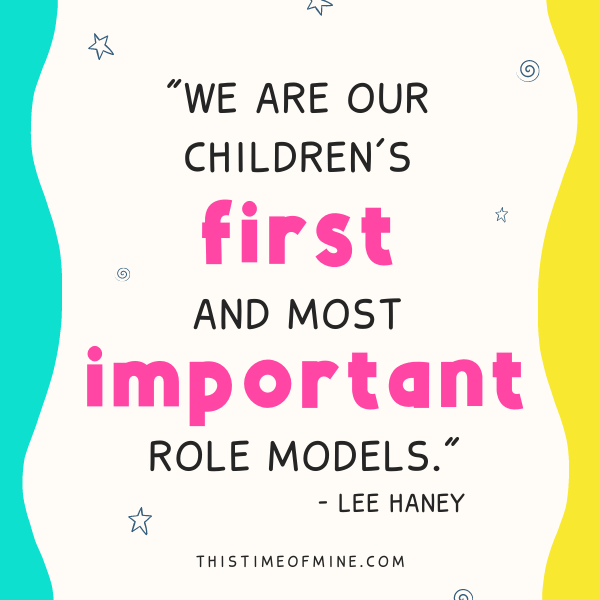
So we can take our kids with us to drop off a birthday treat to a friend or a meal to a sick neighbor. We can take good care of what we have. And we can say thank you more often – including to our kids.
It’s little things like these that help us move away from “do what I say, not what I do,” and lead by example instead. In turn, it will become even more natural for our kids to follow in our footsteps.
5. WIDEN YOUR CHILD’S PERSPECTIVE
Taking a child to a community service project is a great way to contribute to society, but unfortunately, isolated events aren’t usually the solution to ungrateful behavior.
In fact, kids often learn best by repeated exposure and small examples close to their personal sphere of experience. Here are a few ideas:
- Encourage your child to think about how another person might be feeling.
- Watch movies and read stories about people in real life who overcame struggles.
- Talk about your family’s blessings often.
- Discuss ways to share simple things with others (pretty flowers from the garden, extra candy, unused toys, etc.)
- Find opportunities for them to meet and interact with people who come from various backgrounds.
- Deliver goodies to neighbors.
- Talk about what it means to be able to travel, practice religion, have access to modern medicine, vote – along with stories about how many of these privileges came to be.
- Show them how to take care of their belongings properly.
- Teach them about saving, spending, and earning money.
- Help them fill out a donation form to a cause of their choice.
Helping our kids become more aware of the world around them will encourage them to move away from a shortage mindset so they can begin noticing the abundance in their own lives – and develop the desire to share it with others.
Because in reality, happiness is rooted in what we learn to focus on.
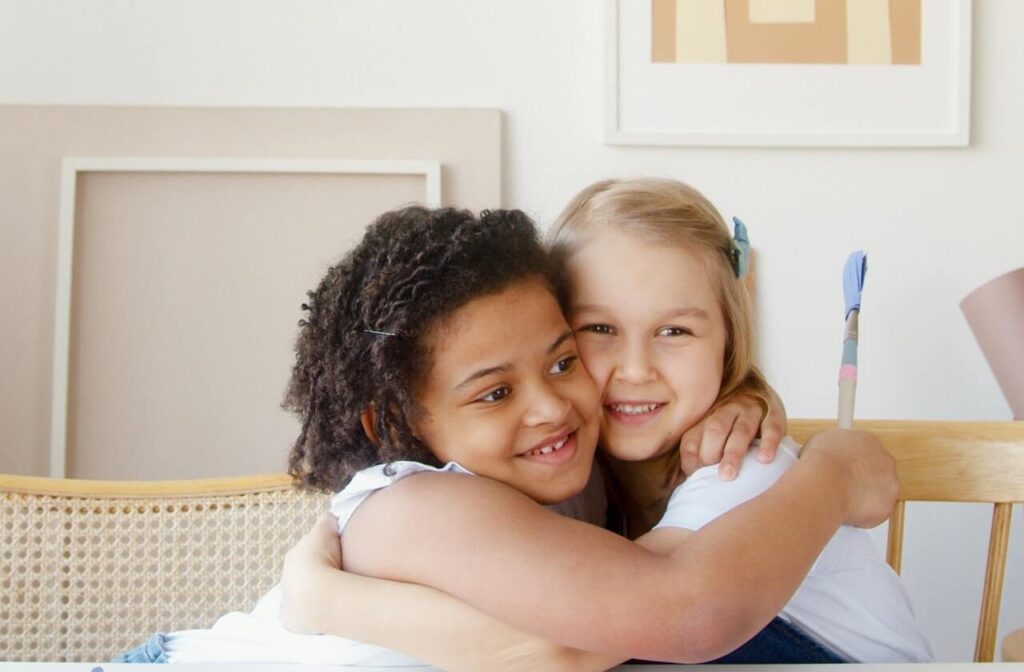
WHAT DOES AN UNGRATEFUL CHILD LOOK LIKE ANYWAY?
My child isn’t entitled…right?
Before reading Amy McCready’s book, The Me, Me, Me Epidemic, I figured my kids were safe from the entitlement trap. They didn’t fit the “spoiled child” stereotype after all, and it wasn’t like I gave them everything they wanted.
But I never truly understood the signs of an ungrateful child. And what was more – I didn’t realize that some of the struggles we were having were actually because of my kids’ growing sense of entitlement!
I told you entitlement was sneaky.
So if you’re like me, and want to know what to look for, here are some of the signs McCready outlines in her book.
An ungrateful child might:
- Become overly disappointed when things don’t work out.
- Expect bribes or rewards for good behavior.
- Pass blame when things go wrong.
- Show inability to handle disappointment.
- Rarely take initiative to help.
- Constantly whine, demand, or bargain for things.
- Care more about their own needs than anything else.
- Expect to be rescued from mistakes.
- Need bribes or treats to comply.
- Feel that rules don’t apply to them.
- Always want more…and more…and more…
Again, if your child is showing behaviors like these, don’t worry. It’s not a sign of how the rest of their life will turn out.
It merely means that it’s time for them to learn a new set of skills.
So before rushing to dole out punishment and harsh discipline, shift your focus back to teaching. Try starting with the skills outlined in this article. And over time, you will see your child become more engaged in their lives and content with what they have.
Are you already working on one of these skills or would you like to? I’d love to hear about it in the comments below!
OTHER HELPFUL POSTS:
- From Helpless To Hopeful: How To Raise Resilient Kids
- Look On The Bright Side: 7 Secrets To Raising Optimistic Kids
- The 12 Secrets Of A Confident Child
- 10 Simple Ways To Teach Kids To Be Kind
want to remember this?
PIN IT TO YOUR FAVORITE BOARD
Share this article:


I keep reading that entitlement begins with modeling behaviors of the parents. Perhaps…but isn’t some of it the childs personality too? Because I honestly don’t see the negative behaviors we see in our child in my husband or myself. We have taught our daughter unselfishness ENDLESSLY since she’s been able to communicate, she’s now 7…and STILL struggles with this (being an only child certainly doesn’t help). “Please, thank you, gratefulness, empathy etc.” have all been taught and modeled, but whete are the virtues weve been instilling? Perhaps being erased by indulgences….? Outside infludences, too many poor examples onYouTube kids?? We’re still trying to figure it out, but its discouraging to say the least. As parents we want to ensure our kids lack no good thing, but there definitely has to be a balance. We thought we were doing a good job, but something is definitely amiss here! I have read many of your articles however, and appreciate these strategies. I do intend to crack down and implement them even more! Thank you! It certainly takes a villiage.
Agreed. A lot of what I am experiencing with my son has evolved from the age of four and where modeling is such an important aspect to a child’s development, I feel my son is demonstrating more so a development into his personality verses a lack of appreciation. I feel being the opposite to the expectation of being entitled is what I need to role model in order for him to understand things from a wider perspective . This article had some useful tips on things to recall and reference to. Thank you.
Good article. Trying to figure out how to start with an ungrateful, rude 23 year old who sits in her room all day and does nothing but plays video games and talks on the phone. No job. No school. No help at home. 250 pounds. Unfortunately it’s taken my wife forever to figure this out. I’ve been angry and frustrated for years!
I myself have been with a certain family for going on 20 years now . My third wife has a son a daughter ,, both have three children a piece . I’ve spent the last 19 years spoiling the heck out of the three of the daughters children . So in a figure of speech I have created the little monsters . They are great children and the village of mentors has taught them a lot , although the sense of entitlement that they portray has stemmed from my never making them earn what they receive . So my grandchildren are now teaching me about my mistake . We all make mistakes as parents .
Thanks for sharing Curtis! Entitlement can sure be tough and it happens to all of us in some way or another. But working on it a little bit at a time will be a blessing in their lives (and yours as well!). It takes time, but it’s worth it!
Great read! Have any on adult children?
Thanks!!
Thanks Bernadette! Entitlement sneaks up on any of us (at any age!), doesn’t it? 😉
Great article!! Well said, written, and thoughtful.
Thank you, Charles!